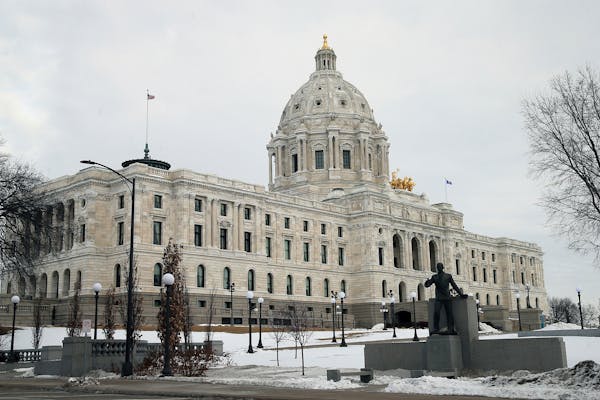A federal judge in Maryland issued a preliminary injunction Wednesday barring enforcement of President Donald Trump's executive order that gave state and local jurisdictions the final decision on whether to accept newly admitted refugees.
The effect, at least for now, is that local debates — such as the heated exchanges in Beltrami and Stearns counties — may have been exercises in futility.
Three of nine public service agencies that help resettle refugees sued Trump in Maryland seeking to overturn his executive order. U.S. District Judge Peter Messitte issued a 31-page memorandum finding that the plaintiffs had demonstrated that the order was unlawful. Messitte said the order fails on "statutory text and structure, purpose, legislative history, judicial holdings, executive practice, the existence of a serious constitutional concern over federal pre-emption, and numerous arbitrary and capricious administrative deficiencies … by giving States and Local Governments veto power over the resettlement of refugees within their borders. …"
Krish O'Mara Vignarajah, a former refugee from Sri Lanka who is now president and CEO of Lutheran Immigration and Refugee Service, one of the plaintiffs, said the preliminary injunction temporarily bars federal and state agencies from enforcing Trump's executive order and leaves little room for a workaround.
"We couldn't be more thrilled that the federal court has upheld the Constitution, congressional legislation and also the assistance that has successfully worked to welcome refugees, assistance in which we have always worked closely with states and localities," Vignarajah said.
The White House could appeal Messitte's ruling to the Fourth Circuit Court of Appeals. Bradley Philip Humphreys, the assistant U.S. attorney representing Trump, could not be reached Wednesday for comment.
Meanwhile, Minnesota counties and refugee resettlement agencies find themselves in limbo.
John Meyers, director of refugee resettlement for Catholic Charities of Southern Minnesota, called the ruling "a rather sudden surprise."
"It's one more twist in this ever-turning process," Meyers said. "Who knows what we might be looking at next week?"
It's important to note, he said, that Trump's executive order could get reinstated.
Meyers said his agency still plans to meet with county boards and communities that want to know more about refugee resettlement.
Micaela Schuneman, refugee services director for the International Institute of Minnesota, said her agency also is taking things one day at a time.
"I still am not really sure what would happen next for us," Schuneman said. "Our goal, of course, is to resettle refugees and help families come back together," she said. "People are arriving. We would like more certainty."
'Difficult for our community'
About 150 people packed the Beltrami County Board room Jan. 7 when it weighed whether to accept refugees, with the majority lined up against the idea. Beltrami County commissioners voted 3-2 not to accept refugees, making it the first Minnesota county to do so and one of the few nationwide.
"I wish we would have tabled the vote. We knew that it was being challenged and that there was a possibility that there would be a stay or an injunction like this," Commissioner Reed Olson said Wednesday. "It's unfortunate that it was so difficult for our community. It kind of renders our vote, at least for the time being, moot."
Olson said he agrees with the judge's ruling, but facing a Jan. 21 deadline set by Trump's order he felt as if the County Board needed to vote. He said he's looking forward to the board meeting next week to see what his colleagues have to say now.
"I'm hoping we will be able to show the rest of Minnesota and the nation that this isn't our only story, in terms of being not welcoming," Olson said.
Olson said misinformation was rampant before the vote, including suggestions that the county was going to bring in large numbers of Muslims and Syrian refugees who would overwhelm county and school district resources.
"I have sympathy for those people that were at the meeting that night," Olson said. "Unfortunately for them and for the people involved, we weren't voting on the stakes they thought."
The Stearns County Board tabled the decision after several commissioners said they needed more information.
Commissioner Joe Perske said that while the preliminary injunction might stop Trump's executive order, it won't kill the discussion around refugees and immigration more broadly in Stearns County. Since the vote, he said, he has received about 60 e-mails on the subject, both for and against refugee resettlement.
"Well, this just puts a twist in the soap opera," Perske said. "This also gives you the opportunity to say, 'Hey, maybe we haven't been paying enough attention to what we're doing. Maybe we need to be doing a better job.' "
Perske noted that nearly all of the refugees in Stearns County are joining family members already there. He can't imagine keeping someone living in a refugee camp from rejoining relatives in St. Cloud.
Like Perske, Commissioner Steve Notch said he hopes the controversy will stimulate more conversations about refugees and other immigrants.
"I'm sure the other four commissioners, as well as myself, have been getting bombarded with e-mails and calls on both sides of the issue," Notch said. "Let's have a meeting and dialogue and let both sides get to know each other. … Maybe it will spark something and all of a sudden there will be a change to the good."
Dan Browning • 612-673-4493

Want to share info with the Star Tribune? How to do it securely

'Safe recovery sites' would offer syringes, naloxone and more to people using drugs. The plan could be in peril.
New Minnesota GOP leaders seek peace with party's anti-establishment wing

Who is Republican Lisa Demuth, Minnesota's first House speaker of color?

